 Petzlover
Petzlover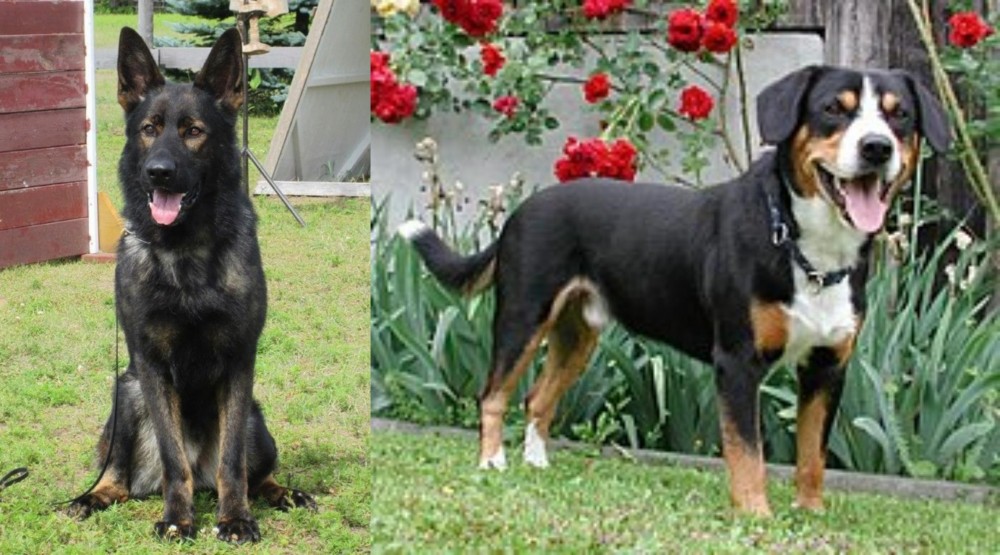 East German Shepherd is originated from Germany but Entlebucher Mountain Dog is originated from Switzerland. East German Shepherd may grow 15 cm / 6 inches higher than Entlebucher Mountain Dog. East German Shepherd may weigh 10 kg / 23 pounds more than Entlebucher Mountain Dog. Both East German Shepherd and Entlebucher Mountain Dog has same life span. East German Shepherd may have less litter size than Entlebucher Mountain Dog. East German Shepherd requires High Maintenance. But Entlebucher Mountain Dog requires Moderate Maintenance
East German Shepherd is originated from Germany but Entlebucher Mountain Dog is originated from Switzerland. East German Shepherd may grow 15 cm / 6 inches higher than Entlebucher Mountain Dog. East German Shepherd may weigh 10 kg / 23 pounds more than Entlebucher Mountain Dog. Both East German Shepherd and Entlebucher Mountain Dog has same life span. East German Shepherd may have less litter size than Entlebucher Mountain Dog. East German Shepherd requires High Maintenance. But Entlebucher Mountain Dog requires Moderate Maintenance
 The East German Shepherd is a line of the German Shepherd Dog breed. The German Shepherd Dog came about when the three types of “continental shepherd dogs” separated into the Dutch Shephers, German Shepherd and Belgian Shepherd. In the 1800’s it was local shepherds who bred their dogs and selected the traits they needed in their geography. The result was dogs in various local areas who all could herd and guard flocks; who were intelligent, strong, fast and had a good sense of smell, but their appearance and skills varied from town to town.
The changes in Germany from agriculture and sheep to industrial cities rendered the German Sheep Dog obsolete. But was it really? Many felt the dog could be a good working dog in the cities as well but needed some refinement in the breed according to Max von Stephanite. At a dog show in 1899, he found what he wanted – the perfect working dog.Stephanitz bought the dog and founded the Society for the German Shepherd. (Verein fur Deutsch Schaferhunde) Stephanitz is considered the developer of the German Shepherd Dog.
The East German Shepherd is a line of the German Shepherd Dog breed. The German Shepherd Dog came about when the three types of “continental shepherd dogs” separated into the Dutch Shephers, German Shepherd and Belgian Shepherd. In the 1800’s it was local shepherds who bred their dogs and selected the traits they needed in their geography. The result was dogs in various local areas who all could herd and guard flocks; who were intelligent, strong, fast and had a good sense of smell, but their appearance and skills varied from town to town.
The changes in Germany from agriculture and sheep to industrial cities rendered the German Sheep Dog obsolete. But was it really? Many felt the dog could be a good working dog in the cities as well but needed some refinement in the breed according to Max von Stephanite. At a dog show in 1899, he found what he wanted – the perfect working dog.Stephanitz bought the dog and founded the Society for the German Shepherd. (Verein fur Deutsch Schaferhunde) Stephanitz is considered the developer of the German Shepherd Dog.
The East German Shepherd is a line of the same breed. There are several different lines of the German Shepherd Dog, with slight difference for the reason they were bred. For instance, the German Shepherd Dog is bred for looks while the East German Shepherd is bred to be a working dog. Often called a DDR German Shepherd, they came about from the Deutsche Democratic Republic or the Republic of East Germany. For about 40 years in East Germany these dogs were bred only within the DDR bloodline.
The East German Shepherd is stronger, heavier boned, leaner, more muscular and solid. During the time of the Berlin Wall, from 1961-1989, there were few German Shepherds for breeding stock on either side of the wall, but especially in the East. There the government controlled the development of the breed. They developed a separate registry for the DDR – East German Shepherd. With such strict standards for a perfect working dog and such little breeding stock, the only dogs allowed to reproduce were the ones that passed a rigorous test and were deemed perfect working dogs.
In West Germany they continued to breed for appearance. The West German Shepherd are the most popular ones and are usually simply called German Shepherds. The show dogs of today and the American line came from the West.
Preserving the East German Shepherd today is important and difficult. It means preserving not improving. The Strength of the East German Shepherd is their body line and style, Today’s breeder must maintain this while making sure there is enough diversity in the gene pool to keep the line healthy without losing its body style and working temperament. It is important that the East German Shepherd have a straight back rather than the sloping one of the German Shepherd Dog or the American lines of the GSD. The working dog is also more aggressive and has a much higher work drive than any of the other German Shepherd Dogs lines.
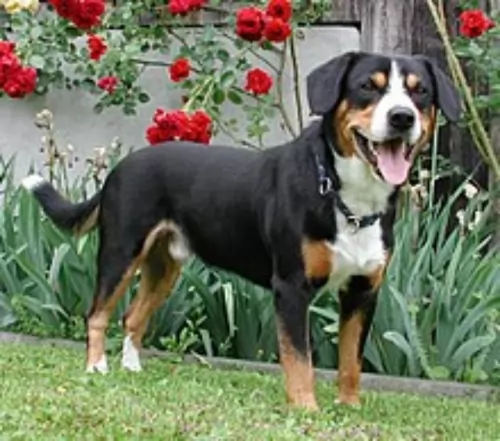 The Entlebucher Mountain Dog is the smallest of the Swiss Mountain Dogs, but he is still a powerful dog used to herd cattle. The four breeds are the Bernese Mountain Dog, the Greater Swiss Mountain Dog, the Appenzeller Mountain Dog and the Entlebucher. It was though that these dogs came to Switzerland with the Romans over 2 centuries ago. The Entlebucher was put to work guarding and herding sheep, pulling carts and flocking cattle. Toward the end of the 19th century the breed was on the edge of extinction because many were breeding them with German Shepherds. So, Franz Schertenleib, in 1889 brought all the existing Entlebuchers together and bred them. He is credited with keeping the breed alive.
The Entlebucher Mountain Dog is the smallest of the Swiss Mountain Dogs, but he is still a powerful dog used to herd cattle. The four breeds are the Bernese Mountain Dog, the Greater Swiss Mountain Dog, the Appenzeller Mountain Dog and the Entlebucher. It was though that these dogs came to Switzerland with the Romans over 2 centuries ago. The Entlebucher was put to work guarding and herding sheep, pulling carts and flocking cattle. Toward the end of the 19th century the breed was on the edge of extinction because many were breeding them with German Shepherds. So, Franz Schertenleib, in 1889 brought all the existing Entlebuchers together and bred them. He is credited with keeping the breed alive.
It is believed that the breed comes originally from a valley in the District of Cantons Lucerne and Berne, called Entlebuch. They were considered the same breed as the Appenzell Cattle Dog until 1913 when they were classified as a Mountain Dog – the fourth breed of Mountain Dog. The AKC did not recognize the breed until 2011.
 What are the differences between the German Shepherd Dog (GSD) and the East German Shepherd? The East German Shepherd has a straight back and a larger bone structure. He has a very large and block shaped head with a lean, athletic build. His lips are taunt and dark, and his nose must be black. He has a scissor bite and strong teeth. His eyes are medium sized almonds that are slanted slightly. The eyes are also very dark. His ears are erect and not too big. His legs, haunches and feet must all be coordinated so that he trots rather than runs.
What are the differences between the German Shepherd Dog (GSD) and the East German Shepherd? The East German Shepherd has a straight back and a larger bone structure. He has a very large and block shaped head with a lean, athletic build. His lips are taunt and dark, and his nose must be black. He has a scissor bite and strong teeth. His eyes are medium sized almonds that are slanted slightly. The eyes are also very dark. His ears are erect and not too big. His legs, haunches and feet must all be coordinated so that he trots rather than runs.
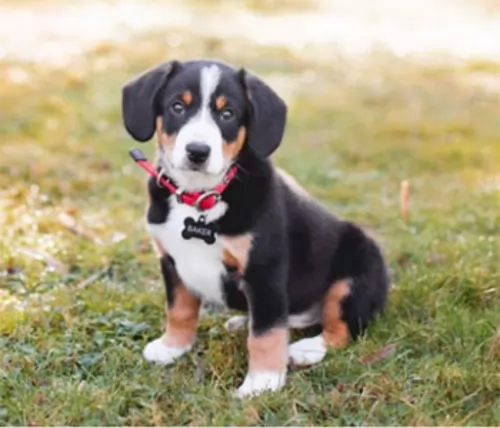 The Entlebucher Mountain Dog is a muscular, compact, and medium sized dog. Their heads are square, and the skull is flat. He has dark eyes that are alert and expressive in a friendly way. Their ears are triangular and hang on the side of his head. With compact feet, a muscular body and well angled hocks, he is a good looking dog and ready for his jobs.
The Entlebucher Mountain Dog is a muscular, compact, and medium sized dog. Their heads are square, and the skull is flat. He has dark eyes that are alert and expressive in a friendly way. Their ears are triangular and hang on the side of his head. With compact feet, a muscular body and well angled hocks, he is a good looking dog and ready for his jobs.
His coat is striking, and it is familiar in its closeness to the other Mountain Dogs coats. Yet he has some distinctive differences that tell you this is not a Bernese or a Swiss, it is an Entlebucher.
 The East German Shepherd is a well- balanced dog. He is sure of himself, friendly, loyal and wants to please his owner. He is intelligent, resilient and attentive. He will make a great family pet. He is aggressive with a high prey drive but that can be tempered with good socialization and training. He is easy to train.
The East German Shepherd is a well- balanced dog. He is sure of himself, friendly, loyal and wants to please his owner. He is intelligent, resilient and attentive. He will make a great family pet. He is aggressive with a high prey drive but that can be tempered with good socialization and training. He is easy to train.
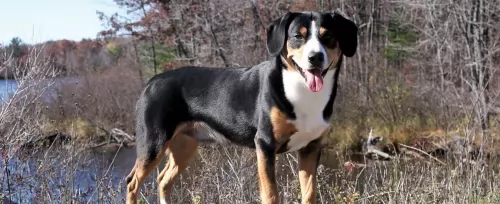 The Entle is a happy, clever dog that needs a job. They are intelligent and physical. They love people and throw themselves at you when they see you. They are loving and loyal but again he has to have a job.
The Entle is a happy, clever dog that needs a job. They are intelligent and physical. They love people and throw themselves at you when they see you. They are loving and loyal but again he has to have a job.
He makes a great watchdog, therapy dog or companion for your children. He only barks when he has to but is wary of strangers and he is territorial.
 Because the East German Shepherd line has been isolated behind the Berlin Wall, there are not many genetic health issues in the line. Most importantly the East German Shepherd shows no hip dysplasia which plagues most GSD. There are a couple of situations to look out for. They are:
Because the East German Shepherd line has been isolated behind the Berlin Wall, there are not many genetic health issues in the line. Most importantly the East German Shepherd shows no hip dysplasia which plagues most GSD. There are a couple of situations to look out for. They are:
A life threatening issue that must be addressed immediately for fear of death. Bloat is caused when a larger dog with a deep chest eats too large a meal before or after strenuous exercise, eats too fast, or drinks too much water. The stomach distends with air or gas and twists. Sometimes it is completely inverted. Get help fast or your dog will die.
 Because these dogs were bred to work you need to feed them a high quality dry food, made for working dogs. It needs to have a good amount of calcium and glucosamine. Feed about 3-4 cups per day divided into 2 feeding times.
Because these dogs were bred to work you need to feed them a high quality dry food, made for working dogs. It needs to have a good amount of calcium and glucosamine. Feed about 3-4 cups per day divided into 2 feeding times.
In addition to bloat as mentioned above, the East German Shepherd can also have both air born, and food born allergies. These are easily treated by your veterinarian.
The East German Shepherd is a high energy, high activity dog so you have some for him. He is agile and athletic. He needs serious exercise and a job is essential. If you can’t give an East German Shepherd a job, then don’t get this dog. He loves tracking and has a high prey drive. Keep him trained, challenged and working. Try tracking and herding trials, obedience, agility, fly ball and bar hunt.
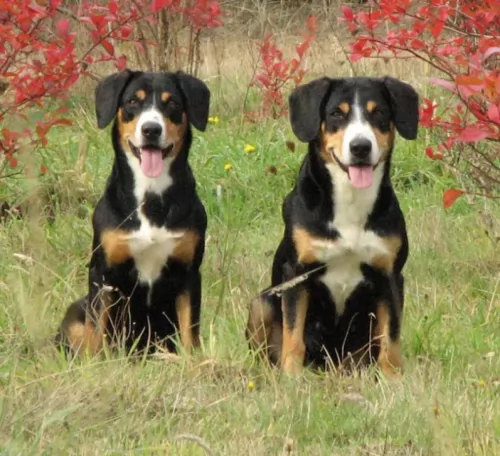 The Entlebucher Mountain Dog is a large working dog. He needs good solid food, but he doesn’t need to be overfed. Give him about 2-3 cups per day fed in 2-3 meals. Be careful of Bloat in the large dog.
The Entlebucher Mountain Dog is a large working dog. He needs good solid food, but he doesn’t need to be overfed. Give him about 2-3 cups per day fed in 2-3 meals. Be careful of Bloat in the large dog.
The Entlebucher Mountain Dog is prone to these issues as well as those mentioned earlier.
Entlebucher Mountain Dogs love to play, to work and to exercise. They are great with people who want to walk them every day, run with them, ride bikes or hike. They can play for hours or work for hours. They need a lot of activity every day and excel at tracking, obedience, herding and agility.